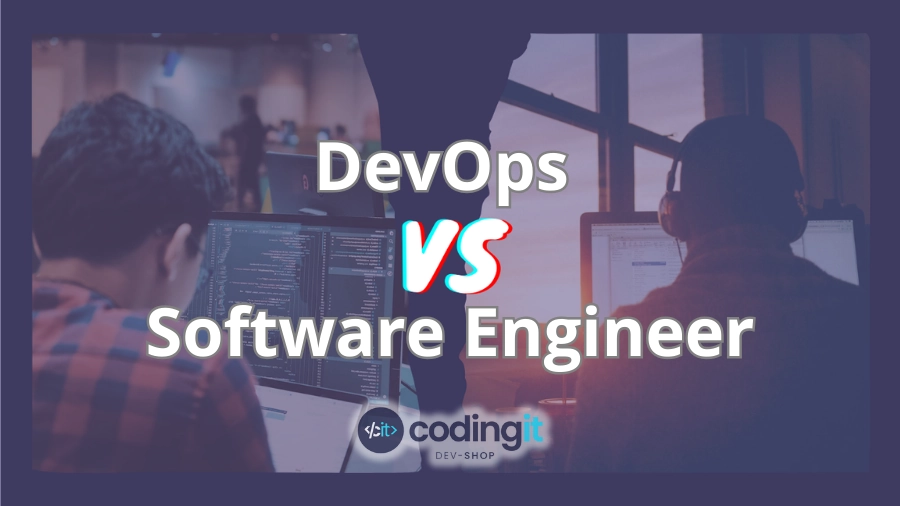When you are on the verge of scaling your company to new heights, you’re likely juggling a thousand different decisions. Each one more urgent than the last. You’ve got a product that’s gaining traction, your user base is growing steadily, and your team is pushing out updates and new features at a breakneck pace.
But lately, things are starting to feel… fragile. Deployments that used to be smooth are suddenly causing hiccups, your servers are acting up under load, and your developers are spending more time firefighting infrastructure issues than actually writing code.
And here you are, staring at your ever-growing to-do list, wondering: Is it time to hire a DevOps engineer? Should I hire another software engineer? You know the answer isn’t black and white. A DevOps Engineer would streamline your deployments, automate the repetitive tasks, and free up your software engineers to do what they do best: innovate. But do you really need one right now? In the DevOps vs software engineer debate, a deciding factor could be considering where your team currently stands.
Look, it’s easy to get caught up in the latest trends, to feel that pressure to follow what everyone else is doing. But your company isn’t “everyone else.” It’s your unique creation, your vision—and that means making decisions that are right for your team, your product, and your future growth. So, before you rush off to post that job listing, let’s dive deeper into what a DevOps engineer actually brings to the table, how they differ from your current software engineers, and most importantly, whether now is the right time to make that move.

What is a DevOps Engineer?
A DevOps Engineer designs the roads and bridges that connect your software development landscape. They’re setting up cloud instances, configuring servers, managing Docker containers, and handling all those under-the-hood details that make it possible for your code to run somewhere other than a developer’s laptop. They are responsible for the entire infrastructure where the code will be hosted. DevOps engineers set up environments in AWS or Azure, build out CI/CD pipelines, and ensure that every time a software change is made, it can be deployed seamlessly to production.
DevOps is not a silver bullet. It’s a very important role, sure, but it’s not a magic solution that will solve all your problems overnight. DevOps is about adding a specific type of muscle to your team. The muscle that handles the infrastructure side of things so your developers can stop wrestling with deployment scripts and go back to building great software.
What Does a Software Engineer Do?
The quintessential hero of the tech world, the one who brings ideas to life with code. Software engineers are the ones meticulously crafting the features your users love, the functionality that makes your app or platform stand out in a crowded market. They’re versatile, adapting to different roles and technologies, shifting between front-end and back-end, diving into databases, APIs, and debugging sessions that stretch into the night. They are the builders, the dreamers of your digital universe.
Software engineers solve complex problems, translating vague user requirements into concrete, usable features. They collaborate with product managers, designers, and even customers, to make sure the product delights. And sure, they’re handling a fair bit of chaos too from time to time. They’re the backbone of your software developments, and right now, they’re probably the ones also managing your infrastructure needs.
As good as they are, even your superstar developers have their limits. They might not admit it, but deep down, they probably wish they could focus more on creating and less on managing deployment environments or fixing infrastructure issues. This is where the difference between a Software Engineer and a DevOps Engineer begins to sharpen into focus. And this is where your decision-making comes into play: Do you continue to let your software engineers deal with both roles or do you free them up to innovate by bringing in a DevOps engineer?
Development Environment Setup
I’m sure you have been in a situation in which a deployment turns into chaos. One minute, everything’s running smoothly on a developer’s local machine, and then – BAM! – deployment time hits, and suddenly, all hell breaks loose. What seemed like a simple push to production quickly spirals into chaos, and before you know it, your Slack channels are blowing up with messages.
Setting up and maintaining multiple environments is a key responsibility of a DevOps engineer. They are in charge of making sure each environment is consistent and reliable. Developers use a local environment for testing, but it is the DevOps engineer who prepares the development, staging, and production environments, where all the code eventually goes. This setup allows for thorough testing, resulting in more robust applications before they go live.

When to Hire a DevOps Engineer?
The million-dollar question: when is the right time to bring in a DevOps engineer? According to Pablo Sosa, CodingIT’s CSO, you don’t necessarily need a DevOps engineer right out of the gate. When you’re in the scrappy early stages, every hire counts, and you often can’t justify bringing in someone to focus solely on infrastructure. Sosa puts it plainly: “If you have three developers, you don’t need a DevOps engineer. At this point, it will be better to outsource the position or let your CTO take that role.” In these early days of a company, people often wear many hats, doing a little bit of everything to keep things moving.
But there comes a point when the stakes change. When your team starts to grow, and you’re staring at a room (virtual or otherwise) of 10+ developers, each with their own unique demands, you realize things are getting… serious. That’s when the scales start to tip. Suddenly, you’re dealing with frequent deployments, complex infrastructure, and a product that’s screaming for scalability. That’s when a DevOps Engineer goes from “nice to have” to “must have”.
In-House vs Outsourcing DevOps
Bringing on a full-time DevOps engineer can feel like a big leap, especially if you’re still trying to figure out whether it’s absolutely necessary. So, naturally, the thought of outsourcing enters the conversation. It’s tempting, right? Getting access to a pool of talent without the long-term commitment or the headache of adding another full-timer to your payroll.
Outsourcing DevOps can work wonders when you’re in that awkward growth phase—big enough to need DevOps expertise but not quite ready to hire someone in-house. Many startups go this route in the beginning, bringing in external help to set up CI/CD pipelines or automate deployments when the team is too small to justify a full-time new employee. It’s a smart move to keep things moving smoothly.
You still need to take into consideration that an external team might not be as intimately familiar with your product’s unique characteristics, your team’s workflow, or the demands of your specific infrastructure. So, you have to make sure you go with people who have experience in the area and who can adapt quickly to new scenarios.
The Evolution of Roles
There’s no denying it: Speculating is part of human nature. Is DevOps here to stay? What about the developers? Will AI replace software engineers? It’s easy to get caught up in these dramatic narratives. But before we start planning for the robot takeover, let’s take a breath and look at the reality of how these roles are evolving.
According to Pablo Sosa, the demand for DevOps isn’t going anywhere. In fact, it’s probably only going to grow. Why? Because no matter how much code you automate or how many AI-driven tools hit the market, someone still needs to manage the ever-complex world of software infrastructure. Your software isn’t going to deploy, scale, and manage itself, no matter how many scripts and smart tools you throw at it.
Are software engineers at risk of becoming obsolete then? Hardly. Sure, AI and no-code platforms are changing the scenario. But that doesn’t mean software engineers are going extinct. Instead of just cranking out code, it could be the case that developers will need to expand their skill sets, diving deeper into machine learning, advanced engineering concepts, and emerging technologies. The question isn’t whether one role will prevail over the other, but how they will adapt and thrive.
AI tools and platforms like Webflow or Bubble are certainly shaking things up. I could ask ChatGPT for a Python script, and it will instantly reply with a complete solution to my request. Tools like these are making it easier than ever for people to dip their toes in the development pool, allowing us to prototype without a single line of code, cutting out much of the repetitive work that used to keep junior developers busy for weeks.
This doesn’t mean developers’ jobs are going anywhere. What it does mean is that the bar is being raised. Simple, routine coding tasks might become less in demand, but the need for complex problem-solving, advanced algorithm development, and integrating new technologies isn’t going anywhere.
Nailing Your Next Hire
Making the right hiring decision is not always crystal clear. If you’re feeling like you’re standing at a crossroads, you are not alone. But it’s time to choose a path that will actually move the needle.
You don’t have to figure it all out on your own. Our business is complex and the landscape is always changing. The decision to hire a DevOps vs software engineer depends on where you’re headed, what stage you’re in, and the unique challenges you’re facing.
A partner who knows how to blend the roles, optimize for efficiency, and give your business a competitive edge might be exactly what you need now. At CodingIT we can assist you with a DevOps engineer to tighten up your infrastructure or a seasoned software engineer who can hit the ground running. We’ve got the talent, the tools, and the expertise to help you make the right move. So, stop wasting time wondering what’s next. Make the call. Bring in the right talent, sharpen your strategy, and let’s get things done.
